Related Research Articles
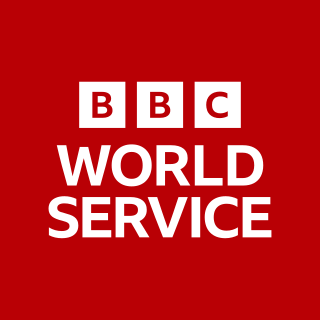
The BBC World Service is an international broadcaster owned and operated by the BBC. It is the world's largest external broadcaster in terms of reception area, language selection and audience reach. It broadcasts radio news, speech and discussions in more than 40 languages to many parts of the world on analogue and digital shortwave platforms, internet streaming, podcasting, satellite, DAB, FM and MW relays. In 2015, the World Service reached an average of 210 million people a week. In November 2016, the BBC announced that it would start broadcasting in additional languages including Amharic and Igbo, in its biggest expansion since the 1940s.

BBC Radio 4 is a British national radio station owned and operated by the BBC. The station replaced the BBC Home Service on 30 September 1967 and broadcasts a wide variety of spoken-word programmes from the BBC's headquarters at Broadcasting House, London. Since 2019, the station controller has been Mohit Bakaya. He replaced Gwyneth Williams, who had been the station controller since 2010.

Freeview is the United Kingdom's sole digital terrestrial television platform. It is operated by Everyone TV and DTV Services Ltd, a joint venture between the BBC, ITV, Channel 4, Channel 5 and Sky. It was launched on 30 October 2002, taking over the licence from ITV Digital which collapsed that year. The service provides consumer access via an aerial to the seven DTT multiplexes covering the United Kingdom. As of July 2020, it has 85 TV channels, 26 digital radio channels, 10 HD channels, six text services, 11 streamed channels, and one interactive channel.

BBC Radio is an operational business division and service of the public service broadcast outlet British Broadcasting Corporation. The service provides national radio stations covering the majority of musical genres, as well as local radio stations covering local news, affairs and interests. It also oversees online audio content.
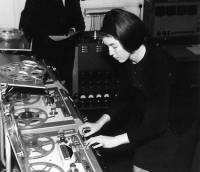
Delia Ann Derbyshire was an English musician and composer of electronic music. She carried out notable work with the BBC Radiophonic Workshop during the 1960s, including her electronic arrangement of the theme music to the British science-fiction television series Doctor Who. She has been referred to as "the unsung heroine of British electronic music", having influenced musicians including Aphex Twin, the Chemical Brothers and Paul Hartnoll of Orbital.

BBC Radio 3 is a British national radio station owned and operated by the BBC. It replaced the BBC Third Programme in 1967 and broadcasts classical music and opera, with jazz, world music, drama, culture and the arts also featuring. The station describes itself as "the world's most significant commissioner of new music", Through its New Generation Artists scheme promotes young musicians of all nationalities. The station broadcasts the BBC Proms concerts, live and in full, each summer in addition to performances by the BBC Orchestras and Singers. There are regular productions of both classic plays and newly commissioned drama.
The radio ballad is an audio documentary format created by Ewan MacColl, Peggy Seeger, and Charles Parker in 1958. It combines four elements of sound: songs, instrumental music, sound effects, and, most importantly, the recorded voices of those who are the subjects of the documentary. The latter element was revolutionary; previous radio documentaries had used either professional voice actors or prepared scripts.
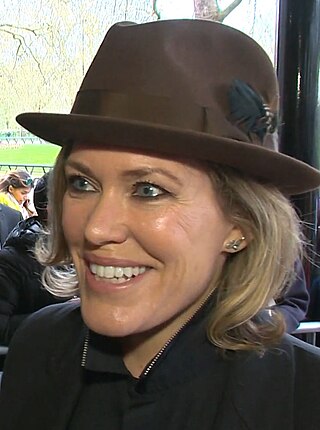
Cerys Matthews is a Welsh singer, songwriter, author, and broadcaster. She was a founding member of Welsh rock band Catatonia and a leading figure in the "Cool Cymru" movement of the late 1990s.
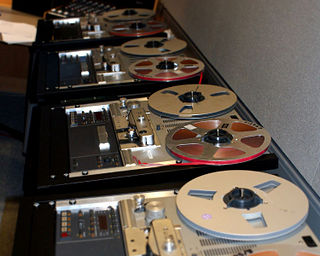
The British Library Sound Archive, formerly the British Institute of Recorded Sound; also known as the National Sound Archive (NSA), in London, England is among the largest collections of recorded sound in the world, including music, spoken word and ambient recordings. It holds more than six million recordings, including over a million discs and 200,000 tapes. These include commercial record releases, radio broadcasts, and privately made recordings.
Smithsonian Folkways is the nonprofit record label of the Smithsonian Institution. It is a part of the Smithsonian's Smithsonian Center for Folklife and Cultural Heritage, located at Capital Gallery in downtown Washington, D.C. The label was founded in 1987 after the family of Moses Asch, founder of Folkways Records, donated the entire Folkways Records label to the Smithsonian. The donation was made on the condition that the Institution continue Asch's policy that each of the more than 2,000 albums of Folkways Records remain in print forever, regardless of sales. Since then, the label has expanded on Asch's vision of documenting the sounds of the world, adding six other record labels to the collection, as well as releasing over 300 new recordings. Some well-known artists have contributed to the Smithsonian Folkways collection, including Pete Seeger, Ella Jenkins, Woody Guthrie, and Lead Belly. Famous songs include "This Land Is Your Land", "Goodnight, Irene", and "Midnight Special". Due to the unique nature of its recordings, which include an extensive collection of traditional American music, children's music, and international music, Smithsonian Folkways has become an important collection to the musical community, especially to ethnomusicologists, who utilize the recordings of "people's music" from all over the world.
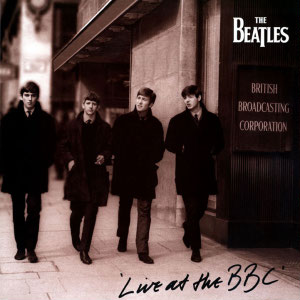
Live at the BBC is a 1994 compilation album featuring performances by the Beatles that were originally broadcast on various BBC Light Programme radio shows from 1963 to 1965. The mono album, available in multiple formats but most commonly as a two-CD set, consists of 56 songs and 13 tracks of dialogue; 30 of the songs had never been issued previously by the Beatles. It was the first official release by the Beatles of previously unreleased performances since The Beatles at the Hollywood Bowl in 1977 and the first containing previously unreleased songs since their final studio album, Let It Be, in 1970.
British Library Sounds is a British Library service providing free online access to a diverse range of spoken word, music and environmental sounds from the British Library Sound Archive. Anyone with web access can use the service to search, browse and listen to 50,000 digitised recordings. Playback and download of an additional 22,000 recordings is available to Athens or Shibboleth users in UK higher and further education. The service was originally launched with funding by the Jisc.

Maida Vale Studios is a complex of seven BBC sound studios, of which five are in regular use, in Delaware Road, Maida Vale, west London.
The British Broadcasting Corporation (BBC) is a British public service broadcaster headquartered at Broadcasting House in London, England. Originally established in 1922 as the British Broadcasting Company, it evolved into its current state with its current name on New Year's Day 1927. The oldest and largest local and global broadcaster by stature and by number of employees, the BBC employs over 21,000 staff in total, of whom approximately 17,900 are in public-sector broadcasting.

Lost television broadcasts are mostly those early television programs which cannot be accounted for in studio archives.
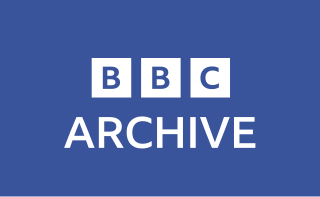
BBC Archives are collections documenting the BBC's broadcasting history, including copies of television and radio broadcasts, internal documents, photographs, online content, sheet music, commercially available music, BBC products, press cuttings, artifacts and historic equipment. The original contents of the collections are permanently retained but are in the process of being digitised. Some collections are being uploaded to the BBC Archives section of the BBC Online website for visitors to view. The archive is one of the largest broadcast archives in the world, with over 15 million items.
Marie Tapscott Slocombe (1912–1995) founded the BBC Sound Archive in 1936. Her keen interest in audio recordings and folk music have made her legacy important in the history of recorded sound.
Folkways Records was a record label founded by Moses Asch that documented folk, world, and children's music. It was acquired by the Smithsonian Institution in 1987 and is now part of Smithsonian Folkways.
'Unlocking Our Sound Heritage' (UOSH) is a UK-wide project that aims to preserve, digitise and provide public access to a large part of the nation's sound heritage. The UOSH project forms part of the core programme 'Save Our Sounds' led by the British Library and involving a consortium of ten regional and national archival institutions. Between 2017 and 2022 the aim is to digitise and make available up to 500,000 rare and unique sounds recordings, not only from the British Library's collection but from across the UK, dating from the birth of recorded sound in the 1880s to the present time. The recordings include sounds such as local dialects and accents, oral histories, previously inaccessible musical performances and plays, and rare wildlife sounds. The consortium will also deliver various public engagement programmes, and a website where up to 100,000 recordings will be freely available to everyone for research, enjoyment and inspiration.
David "Doc" Rowe is a folklorist, author and film-maker who lives and works in the United Kingdom. A graduate of Hornsey College of Arts, he is a prominent lecturer on and advocate for folk traditions and folk music.
References
- ↑ "BBC Archive – The BBC Sound Archive". BBC. Retrieved 15 February 2010.
- 1 2 3 "Saving the sounds of history". BBC News. 30 August 2007. Retrieved 15 February 2010.
- ↑ "Planned Environment Therapy Trust Archive and Study Centre. Publications by Staff. Craig Fees, "Appreciation [Marie Slocombe, 1912-1995]" FOLK MUSIC JOURNAL (1996), pp. 272-273". pettarchiv.org.uk. Archived from the original on 5 September 2008. Retrieved 15 February 2010.
- ↑ "BBC – BBC Internet Blog: Pioneers of the BBC Sound Archive". BBC. Archived from the original on 10 February 2010. Retrieved 15 February 2010.
- ↑ "BBC Archive – Preserving the Sound Archive". BBC. Retrieved 16 February 2010.
- ↑ "The Archive Hour". radiolistings.co.uk. Archived from the original on 7 January 2013. Retrieved 15 February 2010.
- ↑ "Spoken Word Services » Blog Archive » BBC Archive trial takes off". spokenword.ac.uk. Archived from the original on 1 January 2011. Retrieved 15 February 2010.
- ↑ "BBC Archive – The BBC Sound Archive". BBC. Retrieved 16 February 2010.
- ↑ "BBC Archive – The BBC Television Archive". BBC. Archived from the original on 13 February 2010. Retrieved 16 February 2010.
- ↑ "BBC Sound Archive – SSRC". mediaresearchhub.ssrc.org. Archived from the original on 23 April 2009. Retrieved 15 February 2010.
- ↑ "Using the Sound Archive catalogue". bl.uk. Archived from the original on 15 January 2010. Retrieved 15 February 2010.
- ↑ "BBC Archive – Preserving the Sound Archive". BBC. Retrieved 16 February 2010.
- ↑ "BBC Archive – Preserving the Sound Archive". BBC. Retrieved 16 February 2010.